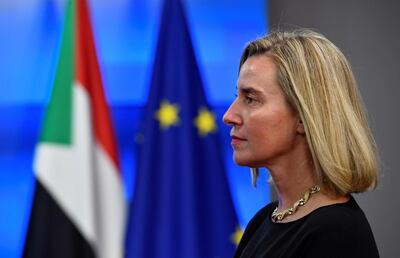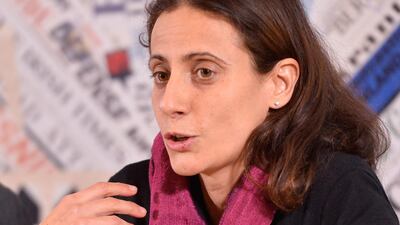The European foreign policy stalwart Nathalie Tocci has returned to Brussels' corridors of power as a special adviser to the bloc’s chief diplomat, Josep Borrell.
Ms Tocci, who played a pivotal role shaping European foreign policy under Mr Borrell’s predecessor, Federica Mogherini, has taken the post as the EU faces its greatest external challenges since its inception.
Around the world, Brussels is grappling with entrenched problems that have been exacerbated by the onset of the coronavirus pandemic.
In the Middle East, the EU is still co-ordinating its response to conflicts in Libya and Syria and, as the US increasingly retreats from the region, many hope that Brussels will fill the void left by Washington over Iran and in the Palestinian-Israeli conflict.
When he took over from Ms Mogherini as high representative for foreign policy last year, hopes were high that in Mr Borrell, a tough-talking Spanish socialist, would give the EU one voice. In his first speech he spoke of Europe needing to learn the “language of power”.

Ms Tocci’s appointment shows the extent of continuity between the two commissioners for foreign policy.
While the director of Italian Istituto Affari Internazionali (IAI) formally accepted the special position with Mr Borrell framing global strategy at the end of last week, she is understood to have been giving him advice on a regular basis in the months since he was appointed to the European Commission.
Ms Tocci has a specialist knowledge of Europe's fringes, particularly of Turkey and Cyprus, and is also known to have a first-rate understanding of the specifics of EU foreign policy, authoring Framing the EU Global Strategy under Ms Mogherini in 2017.
More recently she has been deeply critical of the US withdrawal from the Joint Comprehensive Plan of Action (JCPOA).
Under the 2015 nuclear deal with Iran, Tehran agreed to give up its nuclear weapons programme in exchange for sanctions relief. The US withdrew from the deal under US President Donald Trump in 2018.

In newspaper articles she has railed against the US move on the nuclear deal and renewed calls for the EU to reach out to Tehran following the assassination of Iranian commander Qassem Suleimani earlier this year.
Ms Tocci has also been criticised for calling media reports of popular protests against the Iranian regime in 2017 and 2018 were overhyped. These statements received renewed scrutiny earlier this year when it was revealed the think tank head had accepted a position on the board of the Italian energy company Eni.
Before key decisions by Germany and France, the two EU members of the UN Security Council, on whether to support a US-backed extension of the Iran weapons embargo, Mr Borrell has continued his support of the JCPOA.
The end of the arms embargo, a guarantee of the nuclear deal scheduled for October, is one of the few face-saving benefits of the agreement to which Iran has been able to cling since the US withdrawal. Europe’s inability to block an extension would be another body blow to the 2015 accord.

Speaking at an online conference hosted by the Italian Institute for Political Sciences, Mr Borrell credited the deal with stopping Iran from developing weapons.
“Without this deal, Iran could have gone nuclear right now. Right now, Iran would be a nuclear power, having another factor of instability in a region that doesn't need more instability. Frankly I am convinced that we need to preserve this deal,” he said.
The EU foreign policy chief said he hoped a potential new administration in Washington, following US elections in November, would consider repositioning itself on the JCPOA after other signatories to the deal had failed to make Iran whole on sanctions relief.
“We also have to fulfil our agreement. We cannot say Iran must go back to full compliance if the economic side is not being at all fulfilled,” he said. “I hope a new hypothetical administration will consider the alternatives.”
Another ticking clock for the EU is the prospect of the Israeli annexation of parts of the West Bank.
While Israel has shelved initial plans to extend sovereignty over settlements in the Palestinian territory, effectively killing a two-state solution to the conflict, experts believe Israel's government will press ahead with the plans in the coming weeks or months.
“We are trying to use all of our diplomatic engagement and capabilities in order to convince the Israeli government not to take this decision because it would be counterproductive,” Mr Borrell said.
“I don't want to anticipate anything. I don't want to start threatening anyone but I have to say clearly that it will affect the European Union's relations with Israel,” he added.
The foreign ministers of 11 EU nations have pressed Mr Borrell to present options for the legal consequences of sanctions.
Speaking at a talk hosted by Israeli think tank Mitvim at the end of June, Ms Tocci outlined what would guide the EU’s response to annexation.
“On the economic front, the most obvious consequences would be restrictive measures and these would depend on what sort of annexation would take place and its immediate repercussions,” she said.
Ms Tocci said that legal measures could include revisiting arrangements such as Horizon Europe, the EU’s scientific partnership with Israel, as well as implementing different marketing standards for produce originating from Israel and the Palestinian territories.

